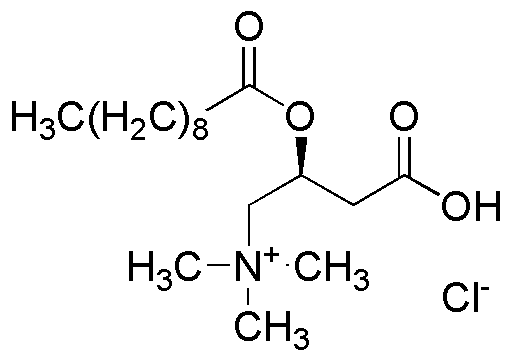Decanoyl-L-carnitine chloride is widely utilized in research focused on:
- Metabolic Studies: This compound is essential for studying fatty acid metabolism and energy production in cells, helping researchers understand metabolic disorders.
- Pharmaceutical Development: It serves as a key ingredient in formulations aimed at enhancing drug delivery systems, particularly for lipid-soluble medications.
- Sports Nutrition: Used in supplements to improve endurance and recovery in athletes by facilitating the transport of fatty acids into mitochondria for energy production.
- Cosmetic Applications: Incorporated in skincare products for its potential benefits in promoting skin hydration and elasticity, making it attractive for the beauty industry.
- Neuroscience Research: Investigated for its neuroprotective properties, offering insights into treatments for neurodegenerative diseases.
General Information
Properties
Safety and Regulations
Applications
Decanoyl-L-carnitine chloride is widely utilized in research focused on:
- Metabolic Studies: This compound is essential for studying fatty acid metabolism and energy production in cells, helping researchers understand metabolic disorders.
- Pharmaceutical Development: It serves as a key ingredient in formulations aimed at enhancing drug delivery systems, particularly for lipid-soluble medications.
- Sports Nutrition: Used in supplements to improve endurance and recovery in athletes by facilitating the transport of fatty acids into mitochondria for energy production.
- Cosmetic Applications: Incorporated in skincare products for its potential benefits in promoting skin hydration and elasticity, making it attractive for the beauty industry.
- Neuroscience Research: Investigated for its neuroprotective properties, offering insights into treatments for neurodegenerative diseases.
Documents
Safety Data Sheets (SDS)
The SDS provides comprehensive safety information on handling, storage, and disposal of the product.
Product Specification (PS)
The PS provides a comprehensive breakdown of the product’s properties, including chemical composition, physical state, purity, and storage requirements. It also details acceptable quality ranges and the product's intended applications.
Certificates of Analysis (COA)
Search for Certificates of Analysis (COA) by entering the products Lot Number. Lot and Batch Numbers can be found on a product’s label following the words ‘Lot’ or ‘Batch’.
*Catalog Number
*Lot Number
Certificates Of Origin (COO)
This COO confirms the country where the product was manufactured, and also details the materials and components used in it and whether it is derived from natural, synthetic, or other specific sources. This certificate may be required for customs, trade, and regulatory compliance.
*Catalog Number
*Lot Number
Safety Data Sheets (SDS)
The SDS provides comprehensive safety information on handling, storage, and disposal of the product.
DownloadProduct Specification (PS)
The PS provides a comprehensive breakdown of the product’s properties, including chemical composition, physical state, purity, and storage requirements. It also details acceptable quality ranges and the product's intended applications.
DownloadCertificates of Analysis (COA)
Search for Certificates of Analysis (COA) by entering the products Lot Number. Lot and Batch Numbers can be found on a product’s label following the words ‘Lot’ or ‘Batch’.
*Catalog Number
*Lot Number
Certificates Of Origin (COO)
This COO confirms the country where the product was manufactured, and also details the materials and components used in it and whether it is derived from natural, synthetic, or other specific sources. This certificate may be required for customs, trade, and regulatory compliance.


